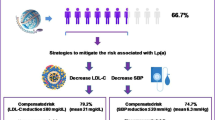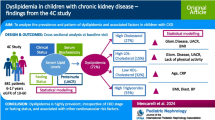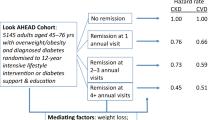Abstract
The aim of this study was to evaluate the influence of endogenous insulin levels and of insulin administration on coronary heart disease (CHD) and on mortality in a cohort of patients with long-standing non-insulin-dependent diabetes mellitus (type 2). In a cross-sectional study, 93 patients (known duration 17±8 years, mean±SD) with poor metabolic control (glycosylated hemoglobin, HbA1c 9.3%±2.09%) were evaluated for CHD, for insulin release (C-peptide), for clinical and metabolic parameters including body mass index (BMI), smoking habits, arterial blood pressure (BP), blood lipids, kidney function, and proteinuria. Life status was ascertained 5 years later by direct examination or through death certificates. At entry, 54 out of 93 patients had CHD; after 5 years, 25 patients had died. Comparisons performed on patients of the same age range showed that patients with CHD (34 vs 24) had a greater BMI, higher diastolic BP, higher creatinine, triglyceride and uric acid levels, and higher fasting and i.v. glucagon-stimulated C-peptide release. By logistic stepwise regression analysis, fasting C-peptide and triglycerides were independently associated with CHD. In the follow-up study, surviving patients (39 vs 19) showed at baseline lower triglyceride and creatinine levels, were less frequently affected by CHD, and received lower doses of insulin; by logistic stepwise regression analysis, presence of CHD, dose of insulin, and creatinine levels were independent risk factors for mortality. These data indicate that in patients with long-standing type 2 diabetes mellitus and poor metabolic control, CHD and overall mortality are related to insulin release and to insulin administration, suggesting that markers of insulin resistance represent additional risk factors for CHD and for mortality. Reduction of insulin resistance, together with achievement of good metabolic control, might prevent morbidity and mortality in long-standing type 2 diabetes mellitus.
Similar content being viewed by others
Author information
Authors and Affiliations
Additional information
Received: 23 May 1997 / Accepted in revised form: 23 December 1997
Rights and permissions
About this article
Cite this article
Pontiroli, A., Pacchioni, M., Camisasca, R. et al. Markers of insulin resistance are associated with cardiovascular morbidity and predict overall mortality in long-standing non-insulin-dependent diabetes mellitus. Acta Diabetologica 35, 52–56 (1998). https://doi.org/10.1007/s005920050101
Issue Date:
DOI: https://doi.org/10.1007/s005920050101




